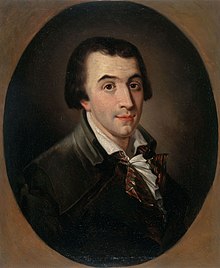Jacques Pierre Brissot de Warville | |
|---|---|
 Portrait by François Bonneville, c. 1790 | |
| Member of the National Convention for Eure-et-Loir | |
| In office 20 September 1792 – 30 October 1793 | |
| Preceded by | Étienne Claye |
| Succeeded by | Claude Julien Maras |
| Constituency | Chartres |
| Member of the Legislative Assembly for Seine | |
| In office 1 October 1791 – 19 September 1792 | |
| Succeeded by | Antoine Sergent-Marceau |
| Constituency | Paris |
| Personal details | |
| Born | Jacques Pierre Brissot 15 January 1754 Chartres, Orléanais, France |
| Died | 31 October 1793 (aged 39) Paris, France |
| Cause of death | Execution by guillotine |
| Resting place | Chapelle expiatoire, Paris 48°52′25″N 2°19′22″E / 48.873611°N 2.322778°E |
| Political party | Girondin |
| Spouse |
Félicité Dupont (m. 1782) |
| Children |
|
| Alma mater | University of Orléans |
| Profession | Journalist, publisher |
| Signature | |
| This article is part of a series on |
| Liberalism in France |
|---|
 |
Jacques Pierre Brissot (French pronunciation: [ʒak pjɛʁ bʁiso], 15 January 1754 – 31 October 1793), also known as Brissot de Warville, was a French journalist, abolitionist, and revolutionary leading the faction of Girondins (initially called Brissotins) at the National Convention in Paris. The Girondins favored exporting the revolution and opposed a concentration of power in Paris. He collaborated on the Mercure de France and the Courier de l'Europe, which sympathized with the insurgents in the American colonies.
In February 1788, Brissot founded the anti-slavery Society of the Friends of the Blacks. With the outbreak of the revolution in July 1789, he became one of its most vocal supporters. As a member of the Legislative Assembly, Brissot advocated for war against Austria and other European powers in order to secure France's revolutionary gains, which led to the War of the First Coalition in 1792. He voted against the immediate execution of Louis XVI which made him unpopular with the Montagnards. He was friendly with Jean-Paul Marat, but in 1793 they were the greatest enemies.
On 3 April 1793, Maximilien Robespierre declared in the Convention that the whole war was a prepared game between Dumouriez and Brissot to overthrow the First French Republic.[1] Conflicts with Robespierre, who accused him of royalism eventually brought about his downfall.[2] On 8 October, the Convention decided to arrest Brissot. Like Madame Roland and Pétion, Brissot was accused of organising (or taking part in) conspicuous dinners.[3] At the end of October 1793, he was guillotined along with 28 other Girondins by Charles-Henri Sanson.[4]
- ^ "Munsey's People Search: Page 1". Archived from the original on 28 January 2023. Retrieved 18 June 2023.
- ^ Wikisource: Œuvres complètes de Maximilien Robespierre. Speech Robespierre against Brissot and the girondins Delivered to the Convention on 10 April 1793 Discours contre Brissot & les girondins
- ^ Linton, Marisa; Harder, Mette (12 March 2015). "'Come and Dine': The Dangers of Conspicuous Consumption in French Revolutionary Politics, 1789–95" (PDF). European History Quarterly. 45 (4): 615. doi:10.1177/0265691415595959. S2CID 143310428 – via academia.edu.
- ^ Sanson Memoirs Vol II p.70